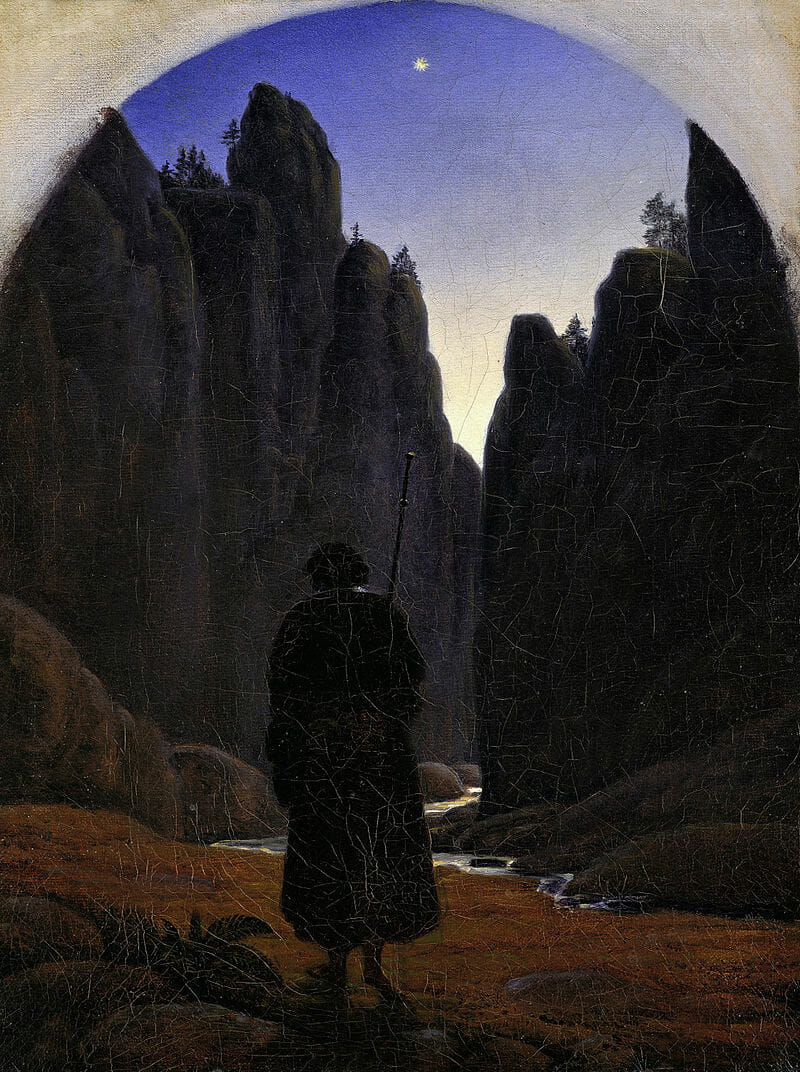
Night Song of a Wandering Shepherd in Asia by Giacomo Leopardi | Pain is universal
Author
Year
Format
Length
Original language
Genre
In 1826 in France, the scientific magazine Journal des Savants published a piece of reportage by a Russian baron, which described his political and cultural voyage across the Asian Steppes. Two years later in Italy, Giacomo Leopardi was struck by a specific part of that issue. It was about Kyrgyz shepherds and their tradition of singing songs to the moon during their night‘s rest. Leopardi noted down in his Zibaldone, a biographical and philosophical diary, that these shepherds would sit on boulders, staring at the moon, and reciting sad words to an equally sad rhythm. This was the origin of the poem Night Song of a Wandering Shepherd in Asia, published in the first edition of Leopardi’s only collection of poems, called Canti.
The poem’s title displays all the focal points needed to understand this complex and densely philosophical text.
Night: a painful apostrophe to the Moon
What doest thou in heaven, O moon?
Say, silent moon, what doest thou?
Thou risest in the evening; thoughtfully
Thou wanderest o’er the plain,
Then sinkest to thy rest again.
And art thou never satisfied
With going o’er and o’er the selfsame ways?
Art never wearied? Dost thou still
Upon these valleys love to gaze?
How much thy life is like
The shepherd’s life, forlorn!
Night Song of a Wandering Shepherd in Asia begins with an apostrophe, a comma, to the moon. The poetic voice, the shepherd, expresses his doubts and frustrations about the meaning of existence. Both human life and the whole universe seem to be nonsensical. The rules that govern the cosmos are impossible to understand. The only certainty is a perpetual pain, spaced out by what Leopardi calls noia: the longing for happiness that is impossible to satisfy. French poet Charles Baudelaire would call it spleen, Italian Nobel Prize Eugenio Montale male di vivere (angst). A void of the soul, the impossibility of feeling both positive and negative emotions.
The shepherd compares life to the tiring walk of an old man who spends his whole life struggling, only to see his struggles result in death. Life is full of sorrows, even at its dawn. Newborn babies cry, and their parents spend their life consoling them about their being alive. Ergo existence, to Leopardi, coincides with suffering, so he wonders whether it would be better not to be born. He leaves a first, feeble glimmer: maybe the moon knows the secret mechanics of life. Maybe it’s only human destiny to be clueless and miserable.

Song: the healing power of lyric
Perhaps, if I had wings
Above the clouds to fly,
And could the stars all number, one by one,
Or like the lightning leap from rock to rock,
I might be happier, my dear flock,
I might be happier, gentle moon!
Perhaps my thought still wanders from the truth,
When I at others’ fortunes look:
Perhaps in every state beneath the sun,
Or high, or low, in cradle or in stall,
The day of birth is fatal to us all.
There was a widespread belief in Romanticism that Leopardi fully embraced. Romantic poets believed that the lyrical genre was the most spontaneous and that it developed naturally even in primitive civilizations. Indeed, the litany of the shepherd is the emblem of how men can manifest their feelings and affections through their singing. His rhythmical voice aimed at the moon has a consolatory function against the pain of life. This is the second feeble glimmer painted in the text: the one given by imagination and poetry.
Wandering Shepherd in Asia: a simple man, a universal condition
My flock, now resting there, how happy thou,
That knowest not, I think, thy misery!
O how I envy thee!
Not only that from suffering
Thou seemingly art free;
That every trouble, every loss,
Each sudden fear, thou canst so soon forget;
But more because thou sufferest
No weariness of mind.
When in the shade, upon the grass reclined,
Thou seemest happy and content,
And great part of the year by thee
In sweet release from care is spent.
But when I sit upon the grass
And in the friendly shade, upon my mind
A weight I feel, a sense of weariness,
That, as I sit, doth still increase
And rob me of all rest and peace.
The choice of expressing a philosophical lament through the voice of a shepherd has a precise aim. Leopardi takes a simple, humble, naive man that lives in faraway lands (a non-defined place in the vast continent of Asia) to strengthen the power of those painful conclusions about human existence. Those truths do not belong only to modern, civilized men, but they are primordial and absolute. As a matter of fact, Leopardi, in the early stages of his philosophy, used to make a distinction between contemporary, corrupted knowledge and the pure wisdom of ancient civilizations that gave them the possibility to be happy. With Night Song of a Wandering Shepherd in Asia, he erases this difference. Unhappiness resides in every era, place, and condition.
Tag
Buy a ☕ for Hypercritic









